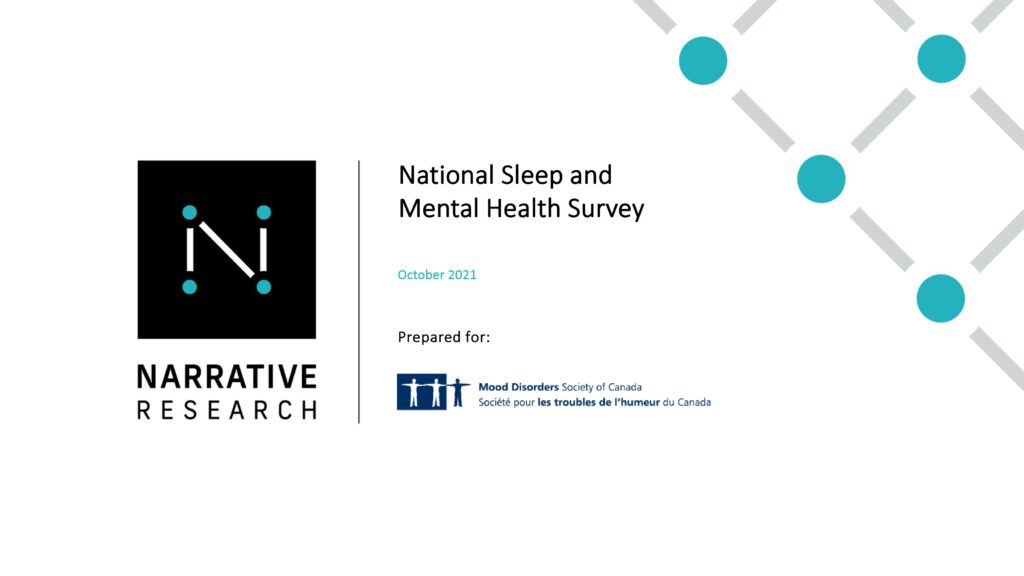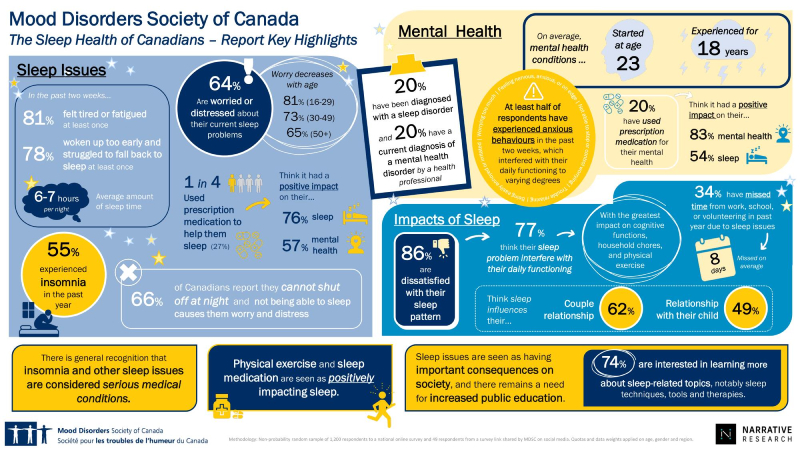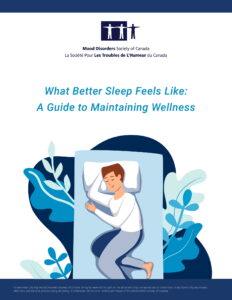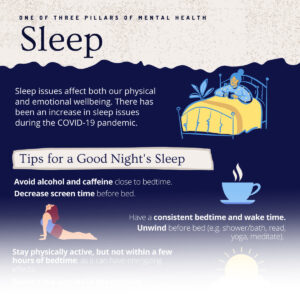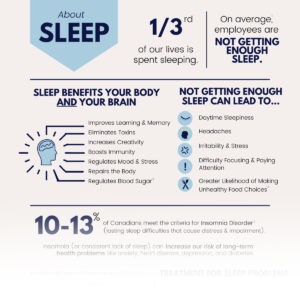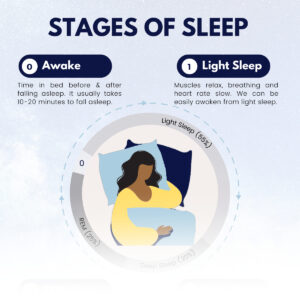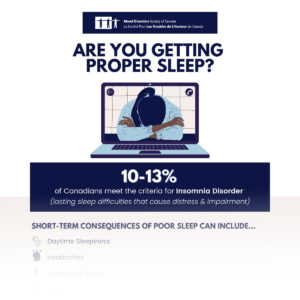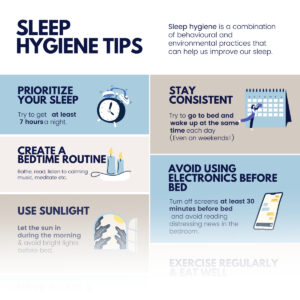
What Sleeping Better Feels Like
Sleep Survey Report
Mood Disorders Society of Canada (MDSC) conducted a national survey to understand sleep behaviours and perceptions about sleep, and the extent to which it is linked to mental health. How sleep supports our mental health, and how mental illness can impact our sleep. Ultimately, MDSC wanted to provide Canadians with information on the importance of sleep to their wellness. MDSC engaged the independent firm Narrative Research to perform this research.
The National Sleep and Mental Health Survey presents a summary of study results, followed by a detailed analysis from each of selected questions.
Sleep Wellness Guide
Getting enough quality sleep is crucial to your physical, mental and emotional health.
The What Better Sleep Feels Like Guide discusses the importance of sleep, the function it performs for your body and mind, along with the potential impacts of a lack of sleep.
Sleep is an often-underestimated component of physical and mental health. It both affects and is affected by our entire well-being. Sleep is a potential source and symptom of multiple other issues we may be facing. You are not alone in facing these concerns; we know millions of Canadians face the same struggles every day.
This guide discusses the importance of sleep, the function it performs for your body and mind, along with the potential impacts of a lack of sleep.
Getting enough quality sleep is crucial to your physical, mental and emotional health.
This guide discusses the importance of sleep, the function it performs for your body and mind, along with the potential impacts of a lack of sleep.
Sleep is an often-underestimated component of physical and mental health. It both affects and is affected by our entire well-being. Sleep is a potential source and symptom of multiple other issues we may be facing. You are not alone in facing these concerns; we know millions of Canadians face the same struggles every day.
This guide discusses the importance of sleep, the function it performs for your body and mind, along with the potential impacts of a lack of sleep.
Printable Resources
How Sleep Works
Stages of Sleep
Are You Getting Enough Sleep?
Sleep Hygiene
Support and Treatment Options
Stages of Sleep
Awake
|
- Time in bed before & after falling asleep. It usually takes 10-20 minutes to fall asleep.
Light Sleep
|
- Makes up around 55% of our sleep cycle.
- Muscles start to relax, breathing and heart rate slow. We can be easily awoken from light sleep.
Deep Sleep
|
- Makes up around 20% of our sleep cycle.
- Also known as “Restorative Sleep”, this stage boosts our immune system, repairs muscles & tissues, and flushes toxins.
REM Sleep
|
- Makes up around 25% of our sleep cycle.
- Rapid Eye Movement (REM) Sleep happens during the latter half of the night. At this stage, our brain is recharged.
- Ramar, K (2021). Sleep and the Immune System.
Are You Getting Enough Sleep?
Canadians Aren’t Getting Enough Sleep!
Did you know that roughly 10-13% of Canadians meet the criteria for insomnia disorder?
We also note the following stats from the Public Health Agency of Canada:

So, What Does This All Mean?
Short-term consequences of poor sleep can include:
- Fatigue
- Daytime sleepiness
- Headaches
- Irritability, lack of patience, stress
- Difficulty focusing and staying attentive
- Increased appetite and likelihood of poor food choices
However, we see that there are longer terms risks, especially with individuals struggling with insomnia disorder. The following are comorbidity rates of insomnia and other health conditions.
- Diabetes – 22%
- Cancer – 23%
- Anxiety – 31%
- Stroke – 29%
- Ulcers – 28%
- Asthma – 21%
- Migraine – 26%
- Arthritis – 24%
- Blood Pressure – 19%
- Heart Disease – 26%
- Back Problems – 23%
- Mood Disorders – 37%
How Are These Difficulties Costing Canadians?
In the workplace, insomnia places a huge burden on the employer and the employee.
- Annually, there is a cost of over $5,000 per person per year.
- There is an increase in presenteeism. Roughly 5 weeks of work is lost per year versus 3 days for a good sleeper.
- There is also an increase in absenteeism. Roughly 1 week of work is lost per year due to insomnia versus 0.3 days for a good sleeper.
- Furthermore, workplace accidents are 2 times higher versus a good sleeper. (This doesn’t include driving accidents).
- Public Health Agency of Canada (2019). Are Canadian Adults Getting Enough Sleep?
- Sleep On It (2019). Why Sleep?
- M, T., Insomnia. Health Reports. Statistics Canada. Catalogue 82-003, Vol. 17, No. 1.
- Daley, M., et al., The economic burden of insomnia: direct and indirect costs for individuals with insomnia syndrome, insomnia symptoms, and good sleepers. Sleep, 2009. 32(1): p. 55-64.
Sleep Hygiene
It Is Important to Maintain Good Sleep Hygiene
Stay Consistent
Try to get at least 7 hours of sleep each night. Try to wake up around the same time each day.
Establish a bedtime routine
Create a wind down schedule and follow it roughly the same time each night. For example, take a bath, do your skincare routine, brush your teeth, read a book, turn off the lights.
Reduce screen time before bed
Try and shut down electronics (phone, tablet, TV, etc.) 30 minutes before bedtime.
Incorporate daylight into your waking up routine
Natural light will help regulate your biological clock.
Exercise and Diet
Consistent exercise schedule will be helpful for sleep. Reduce caffeine, alcohol and large meals before bed.
Create a comfortable sleep environment
Make sure your area is nice and dark. Keep the temperature on the cooler side. Have items that help you relax and wind down such as comfortable blankets, night eye mask, etc.
- Dr. Jeffery Habert (2021). The Impact of Insomnia and Sleep Deprivation in the Workplace
Support and Treatment Options
There Are Various Forms of Support and Treatment Options for Troubles With Sleep
CBTi
Cognitive Behavioural Therapy for Insomnia (CBTi) is a non-medication approach to getting your sleep back. Using certain strategies, CBTi shows users how to break habits and form new, healthier ones.
There are 5 components of CBTi;
- Sleep Hygiene
- Relaxation Therapy
- Sleep Restriction
- Stimulus Control
- Cognitive Therapy
These techniques are used over several weeks to help create a better sleep environment and routine. It will also help with your thoughts and emotions when it comes to sleep.
Various forms of CBTi can be completed by the user. Either online, in person, in a group setting or self-guided.
For more information on CBTi, please visit: mySleepwell.ca.
Medication
Pharmacological options can be used alongside of CBTi for faster results.
Sleep hygiene recommendations alongside medication is also a very common form of treatment.
Be mindful when taking certain medications. Some side effects may include:
- Daytime sedation
- Memory and motor deficits
- Tolerance, dependence
- Rebound insomnia
There are new sleep medications however that work by decreasing excessive wakefulness in individuals struggling with insomnia.
It is important that when considering medications, individuals should always consult a primary care provider.
When to Talk to Your Doctor?
Sleep troubles are causing serious disturbances in various parts of your life:
- Social
- Occupational
- Educational
- Behavioural (Relationships)
- Experiencing excessive daytime sleepiness
- New or worsening of anxiety or depression
- My Sleepwell (2020). What is CBTi?
- Toward Optimized Practice. Assessment to Management of Adult Insomnia Clinical Practice Guidelines. Alberta. December 2015.
- Sateia et al (2017). Clinical Practice Guideline for the Pharmacologic Treatment of Chronic Insomnia in Adults: An American Academy of Sleep Medicine Clinical Practice Guideline. Journal of Clinical Sleep Medicine.
- Dr. Jeffery Habert (2021). The Impact of Insomnia and Sleep Deprivation in the Workplace.
Sleep Support Links
TikTok Sleep Videos
MDSC would like to thank Eisai Limited for an unrestricted educational grant which made it possible for MDSC to develop these sleep resources.
